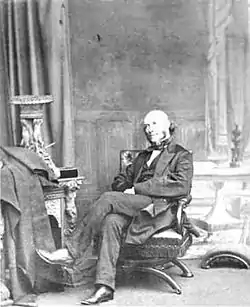William Allen Miller
William Allen Miller FRS (17 December 1817 – 30 September 1870) was a British scientist.
William Allen Miller | |
|---|---|
 William Allen Miller | |
| Born | 17 December 1817 |
| Died | 30 September 1870 (aged 52) |
| Nationality | English |
| Alma mater | King's College London |
| Awards | Gold Medal of the Royal Astronomical Society |
| Scientific career | |
| Fields | Chemistry Astronomy |
Life
Miller was born in Ipswich, Suffolk and educated at Ackworth School and King's College London. He was related to William Allen and first cousin to the leading suffragist Anne Knight.[1]
On the death of John Frederic Daniell he succeeded to the Chair of Chemistry at King's. Although primarily a chemist, the scientific contributions for which Miller is mainly remembered today are in spectroscopy and astrochemistry, new fields in his time.
Miller won the Gold Medal of the Royal Astronomical Society in 1867 jointly with William Huggins, for their spectroscopic study of the composition of stars.[2] In 1845, he was elected a Fellow of the Royal Society.[3]
According to his obituary,[4] Miller married Eliza Forrest of Birmingham in 1842. He died in 1870, a year after his wife, and they are both buried at West Norwood Cemetery. They were survived by a son and two daughters.
References
- Edward H. Milligan, ‘Knight, Anne (1786–1862)’, Oxford Dictionary of National Biography, Oxford University Press, 2004 accessed 29 Aug 2017
- William Huggins & W.A. Miller (1 January 1864) On the spectrum of some nebula, Proceedings of the Royal Society, link from Internet Archive
- "Library and Archive catalogue". Royal Society. Archived from the original on 18 February 2012. Retrieved 30 January 2011.
- Royal Society of Great Britain (1871). "Obituary". Proceedings of the Royal Society of London. 19: xi–xvi.
Further reading
| Wikimedia Commons has media related to William Allen Miller. |
| Wikisource has original text related to this article: |
- Adams, C. W. (1943). "William Allen Miller and William Hallowes Miller (A Note to the Early History of Spectroscopy)". Isis. 34 (4): 337–339. doi:10.1086/347830. S2CID 143656348.
- Ashley-Miller, Michael (2008). "William Allen Miller (1817–70): a distinguished scientist re-discovered". Journal of Medical Biography. 16 (4): 237–240. doi:10.1258/jmb.2008.008012. PMID 18953000. S2CID 207200225. Archived from the original on 15 July 2011.
- Miller, W. A. (1871). Introduction to the Study of Inorganic Chemistry. London: Longmans, Green, and Company.
william allen miller.
